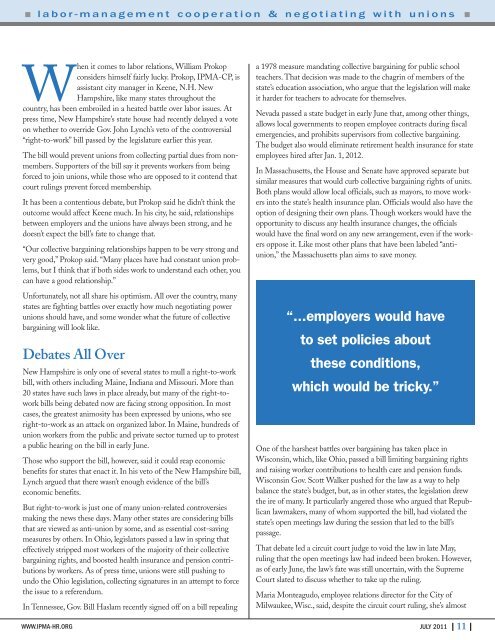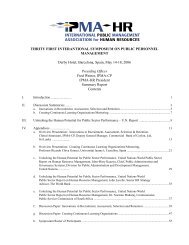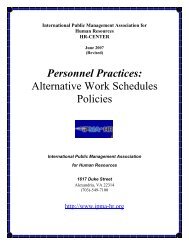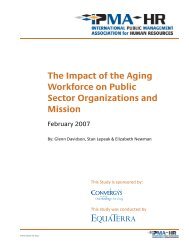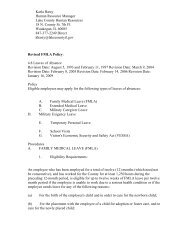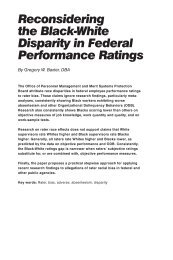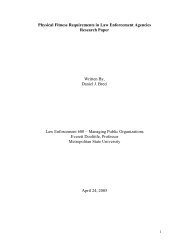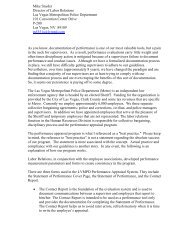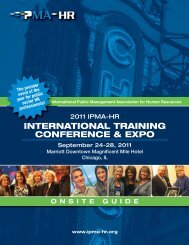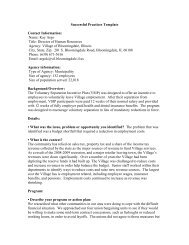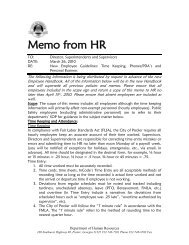July 2011 issue of HR News magazine - IPMA
July 2011 issue of HR News magazine - IPMA
July 2011 issue of HR News magazine - IPMA
You also want an ePaper? Increase the reach of your titles
YUMPU automatically turns print PDFs into web optimized ePapers that Google loves.
■ l a b o r - m a n a g e m e n t c o o p e r a t i o n & n e g o t i a t i n g w i t h u n i o n s ■<br />
When it comes to labor relations, William Prokop<br />
considers himself fairly lucky. Prokop, <strong>IPMA</strong>-CP, is<br />
assistant city manager in Keene, N.H. New<br />
Hampshire, like many states throughout the<br />
country, has been embroiled in a heated battle over labor <strong>issue</strong>s. At<br />
press time, New Hampshire’s state house had recently delayed a vote<br />
on whether to override Gov. John Lynch’s veto <strong>of</strong> the controversial<br />
“right-to-work” bill passed by the legislature earlier this year.<br />
The bill would prevent unions from collecting partial dues from nonmembers.<br />
Supporters <strong>of</strong> the bill say it prevents workers from being<br />
forced to join unions, while those who are opposed to it contend that<br />
court rulings prevent forced membership.<br />
It has been a contentious debate, but Prokop said he didn’t think the<br />
outcome would affect Keene much. In his city, he said, relationships<br />
between employers and the unions have always been strong, and he<br />
doesn’t expect the bill’s fate to change that.<br />
“Our collective bargaining relationships happen to be very strong and<br />
very good,” Prokop said. “Many places have had constant union problems,<br />
but I think that if both sides work to understand each other, you<br />
can have a good relationship.”<br />
Unfortunately, not all share his optimism. All over the country, many<br />
states are fighting battles over exactly how much negotiating power<br />
unions should have, and some wonder what the future <strong>of</strong> collective<br />
bargaining will look like.<br />
Debates All Over<br />
New Hampshire is only one <strong>of</strong> several states to mull a right-to-work<br />
bill, with others including Maine, Indiana and Missouri. More than<br />
20 states have such laws in place already, but many <strong>of</strong> the right-towork<br />
bills being debated now are facing strong opposition. In most<br />
cases, the greatest animosity has been expressed by unions, who see<br />
right-to-work as an attack on organized labor. In Maine, hundreds <strong>of</strong><br />
union workers from the public and private sector turned up to protest<br />
a public hearing on the bill in early June.<br />
Those who support the bill, however, said it could reap economic<br />
benefits for states that enact it. In his veto <strong>of</strong> the New Hampshire bill,<br />
Lynch argued that there wasn’t enough evidence <strong>of</strong> the bill’s<br />
economic benefits.<br />
But right-to-work is just one <strong>of</strong> many union-related controversies<br />
making the news these days. Many other states are considering bills<br />
that are viewed as anti-union by some, and as essential cost-saving<br />
measures by others. In Ohio, legislators passed a law in spring that<br />
effectively stripped most workers <strong>of</strong> the majority <strong>of</strong> their collective<br />
bargaining rights, and boosted health insurance and pension contributions<br />
by workers. As <strong>of</strong> press time, unions were still pushing to<br />
undo the Ohio legislation, collecting signatures in an attempt to force<br />
the <strong>issue</strong> to a referendum.<br />
In Tennessee, Gov. Bill Haslam recently signed <strong>of</strong>f on a bill repealing<br />
a 1978 measure mandating collective bargaining for public school<br />
teachers. That decision was made to the chagrin <strong>of</strong> members <strong>of</strong> the<br />
state’s education association, who argue that the legislation will make<br />
it harder for teachers to advocate for themselves.<br />
Nevada passed a state budget in early June that, among other things,<br />
allows local governments to reopen employee contracts during fiscal<br />
emergencies, and prohibits supervisors from collective bargaining.<br />
The budget also would eliminate retirement health insurance for state<br />
employees hired after Jan. 1, 2012.<br />
In Massachusetts, the House and Senate have approved separate but<br />
similar measures that would curb collective bargaining rights <strong>of</strong> units.<br />
Both plans would allow local <strong>of</strong>ficials, such as mayors, to move workers<br />
into the state’s health insurance plan. Officials would also have the<br />
option <strong>of</strong> designing their own plans. Though workers would have the<br />
opportunity to discuss any health insurance changes, the <strong>of</strong>ficials<br />
would have the final word on any new arrangement, even if the workers<br />
oppose it. Like most other plans that have been labeled “antiunion,”<br />
the Massachusetts plan aims to save money.<br />
“...employers would have<br />
to set policies about<br />
these conditions,<br />
which would be tricky.”<br />
One <strong>of</strong> the harshest battles over bargaining has taken place in<br />
Wisconsin, which, like Ohio, passed a bill limiting bargaining rights<br />
and raising worker contributions to health care and pension funds.<br />
Wisconsin Gov. Scott Walker pushed for the law as a way to help<br />
balance the state’s budget, but, as in other states, the legislation drew<br />
the ire <strong>of</strong> many. It particularly angered those who argued that Republican<br />
lawmakers, many <strong>of</strong> whom supported the bill, had violated the<br />
state’s open meetings law during the session that led to the bill’s<br />
passage.<br />
That debate led a circuit court judge to void the law in late May,<br />
ruling that the open meetings law had indeed been broken. However,<br />
as <strong>of</strong> early June, the law’s fate was still uncertain, with the Supreme<br />
Court slated to discuss whether to take up the ruling.<br />
Maria Monteagudo, employee relations director for the City <strong>of</strong><br />
Milwaukee, Wisc., said, despite the circuit court ruling, she’s almost<br />
WWW.<strong>IPMA</strong>-<strong>HR</strong>.ORG JULY <strong>2011</strong> | 11 |


